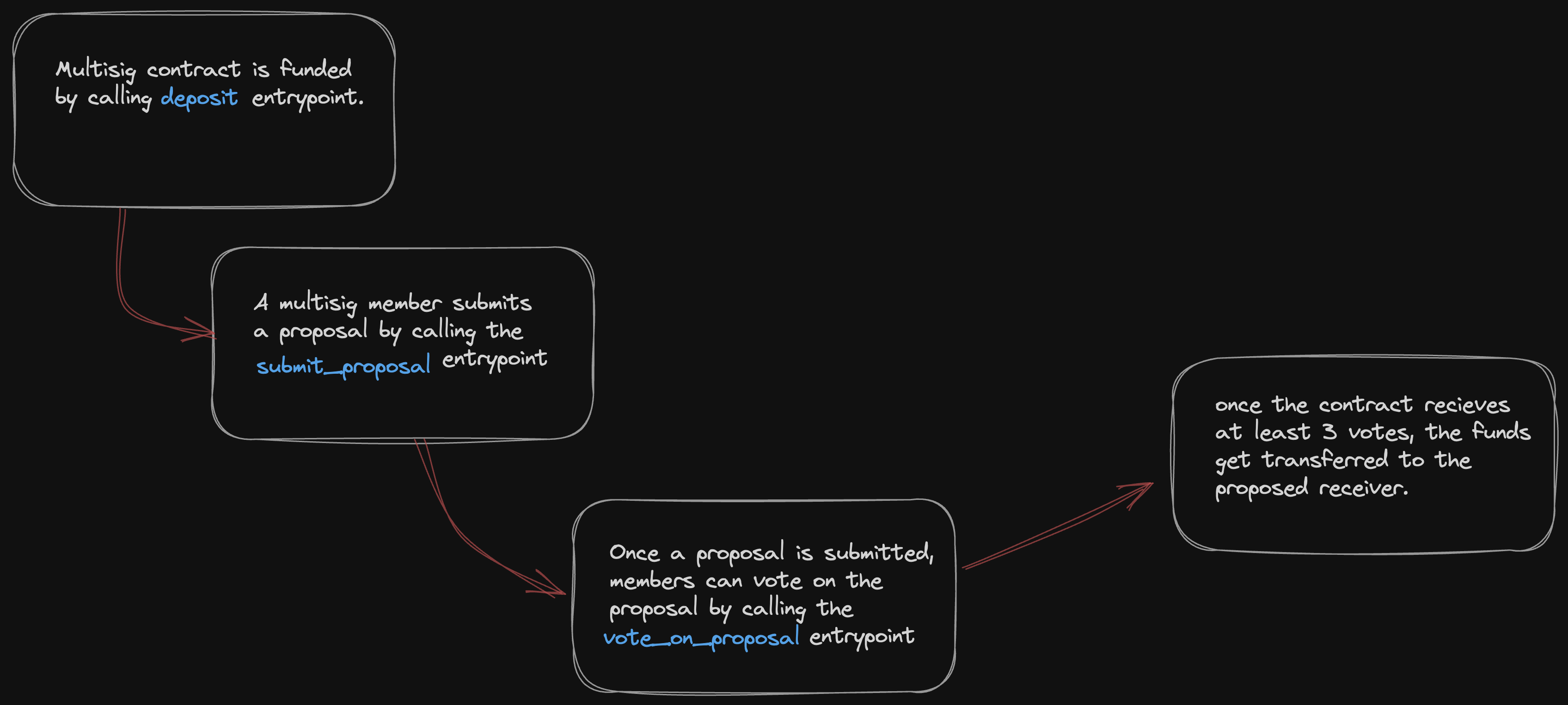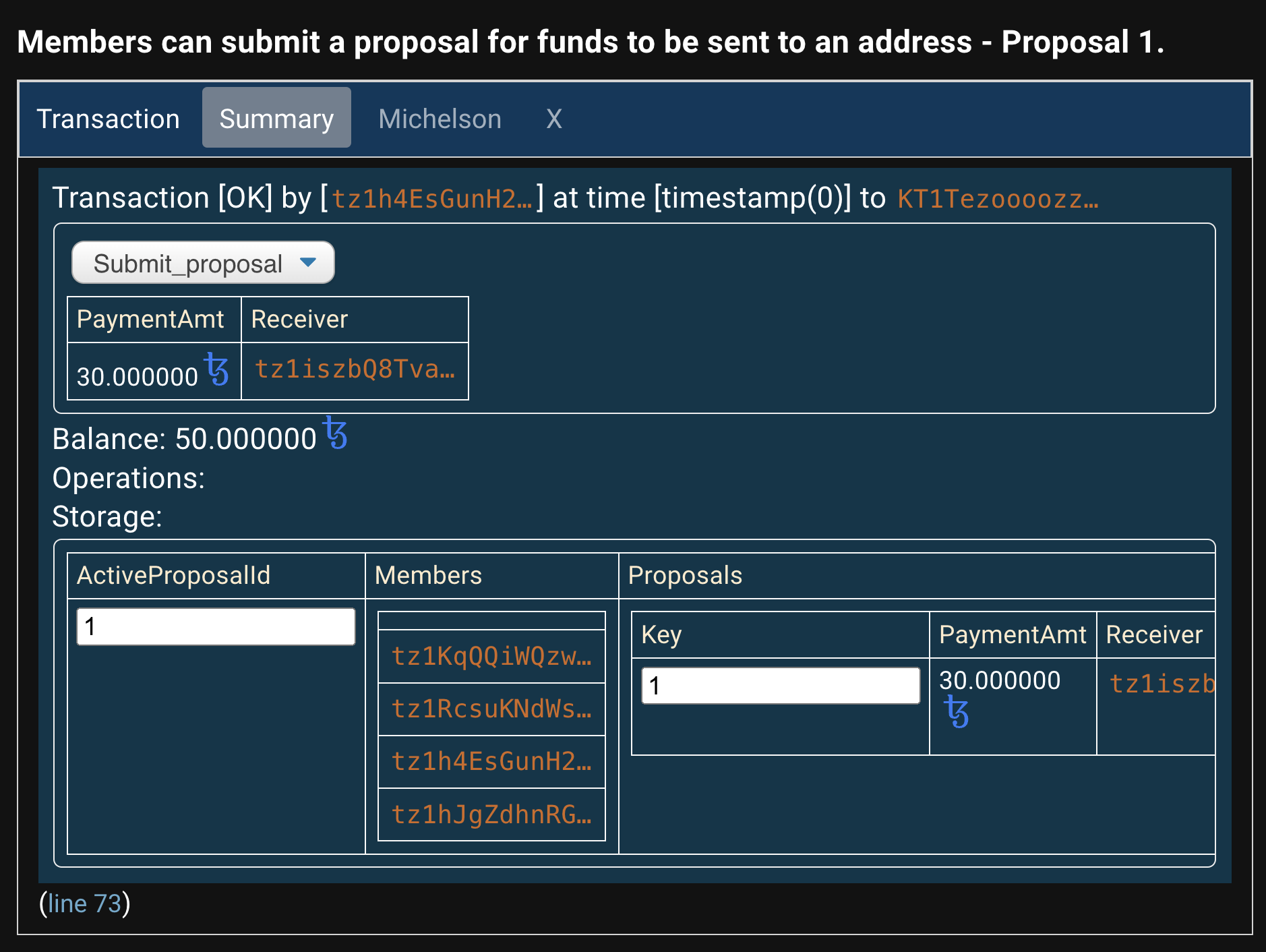interactive
Building a multisig smart contract in SmartPy
To follow along with this tutorial, you can use the SmartPy IDE.
Let's think through how the contract will work;

Now, we'll get into the contract. First, we'll define the proposal_type. This type represents a proposal to send a certain amount of funds to a certain account. By defining the type, we can prevent invalid proposals from being sent to our contract.
import smartpy as sp
@sp.module
def main():
proposal_type:type = sp.big_map[
sp.int,
sp.record(
paymentAmt = sp.mutez,
receiver=sp.address,
voters = sp.set[sp.address],
)
]
The proposal_type is a big_map of all of the proposals, indexed by an integer key. Each proposal includes an amount to be paid, the account to receive the funds, and a list of accounts that voted in favor of the proposal. This contract doesn't have a way to vote against the proposal, so accounts that are against the proposal simply abstain.
Next, we'll define the class and also define the__init__ method, which creates a new object from the class. This method initializes the storage with an empty list of proposals. It also stores the members of the contract and the number of votes required to approve a proposal, both of which cannot be changed.
class MultiSigContract(sp.Contract):
def __init__(self, members, requiredVotes):
# Keep track of all the proposals submitted to the multisig
self.data.proposals = sp.cast(sp.big_map(), proposal_type)
self.data.activeProposalId = 0
self.data.members = sp.cast(members, sp.set[sp.address])
self.data.requiredVotes = sp.cast(requiredVotes, sp.nat)
Now, let's define our deposit entrypoint. This is the entrypoint that allows for funds to be deposited into the contract. The only check we perform here is to check that the depositor is a member of the multisig before allowing the funds to be deposited.
@sp.entrypoint
def deposit(self):
assert self.data.members.contains(sp.sender), 'Not a Member of MultiSig'
The next step is to define our submit_proposal entrypoint. This entrypoint allows members of the multisig to submit a proposal for other members to vote on. Note that the submitter must be a member but the receiver does not need to be a member.
@sp.entrypoint
def submit_proposal(self, params):
"""
Submit a new proposal for members
of the MultiSig to vote for.
"""
assert self.data.members.contains(sp.sender), 'Not a Member of MultiSig'
assert params.paymentAmt <= sp.balance, 'The MultiSig does not have enough funds for this proposal'
self.data.activeProposalId += 1 # submitting a new proposal inactivates the last one
self.data.proposals[self.data.activeProposalId]=sp.record(
paymentAmt=params.paymentAmt,
receiver=params.receiver,
voters=sp.set(sp.sender),
)
Lastly, we allow members to vote on the proposal using the submit_proposal entrypoint.
@sp.entrypoint
def vote_on_proposal(self):
assert self.data.members.contains(sp.sender), 'Not a Member of MultiSig'
# check if the user has previously voted on the proposal
assert not self.data.proposals[self.data.activeProposalId].voters.contains(sp.sender), "Member has voted on this proposal"
self.data.proposals[self.data.activeProposalId].voters.add(sp.sender)
if sp.len(self.data.proposals[self.data.activeProposalId].voters) == self.data.requiredVotes:
sp.send(self.data.proposals[self.data.activeProposalId].receiver, self.data.proposals[self.data.activeProposalId].paymentAmt)
Once the no. of required votes is reached, the proposedAmt is sent to the receiver's wallet address.
With our entrypoints written, we can move on to writing our tests.
@sp.add_test(name="Multisig")
def test():
scenario = sp.test_scenario(main)
alice = sp.test_account('alice')
bob = sp.test_account('bob')
charlie = sp.test_account('charlie')
dani = sp.test_account('dani')
earl = sp.test_account('earl')
scenario.h3("MultiSig Proposal Contract")
members = sp.set([alice.address, bob.address, charlie.address, earl.address])
contract = main.MultiSigContract(members, 3)
scenario += contract
scenario.h3("Members can add funds to the contract")
contract.deposit().run(sender=alice.address, amount=sp.tez(50))
scenario.h3("Members can submit a proposal for funds to be sent to an address - Proposal 1.")
contract.submit_proposal(sp.record(paymentAmt=sp.tez(30), receiver=dani.address)).run(sender=alice.address)
scenario.h3('Non-members cannot vote on proposals')
contract.vote_on_proposal().run(valid=False, sender = dani.address)
scenario.h3('Member 2 can vote on proposal')
contract.vote_on_proposal().run(sender = bob.address)
scenario.h3('Member 3 can vote on proposal')
contract.vote_on_proposal().run(sender = charlie.address)
scenario.h3('Contract balance should drop to 20tez after transfer')
scenario.verify(contract.balance == sp.tez(20))
scenario.h3("A New proposal can be created")
contract.submit_proposal(sp.record(paymentAmt=sp.tez(20), receiver=dani.address)).run(sender=alice.address)
scenario.h3("New proposal can be voted on")
contract.vote_on_proposal().run(sender = charlie.address)
To test that everything works correctly, hit the run button at the top of the SmartPy IDE. You'll see a log displayed to the right of your screen with details of the smart contract execution like below;

The logs show:
- The entrypoint being called e.g
submit_proposal - The parameters passed to the entrypoint e.g
paymentAmtandreceiver. - The balance in the contract
- The operations being run by the contract; for example transferring tez to a wallet address.
- Contents of the contract's storage.
Once we confirm that our tests run correctly, we can go ahead to deploy our contract to the ghostnet and test the entrypoints from a smart contract explorer's UI like Better call dev.
Complete version of the contract.
Improving the multisig contract
One downside to the multisig contract we have written in this section is that a member of the multisig can spam the multisig by sending multiple new proposals to stop members from being able to vote for the current active proposal. Can you think of a way to solve this problem? If you can, update the contract we have written above and let us know on the Tezos discord channel.